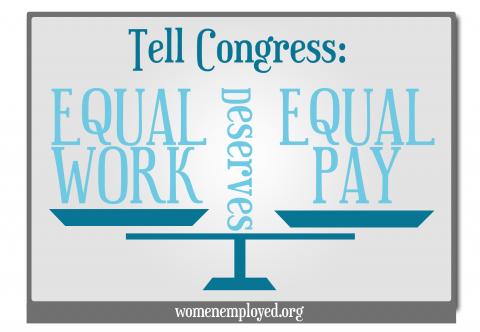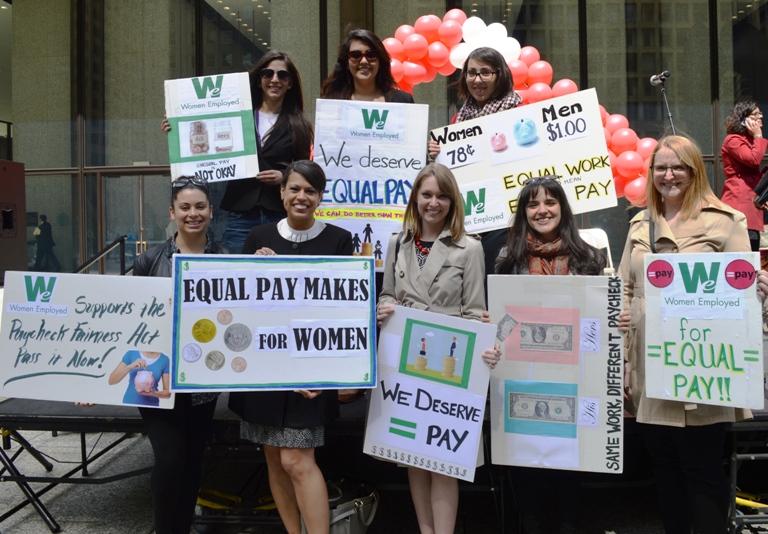
Tell Congress Equal Work Deserves Equal Pay
The Wage Gap: Short-Changing Women and Families
Let's fast forward to the year 2059. My 11-year old daughter Lucy will be 55, and my two-year old twins, Cecilia and Eleanor, will turn 45. It's fun to contemplate all that they might achieve over the next four decades.
It's not so fun to think about the fact that it will take this long—40 years, according to a recent report by the Institute for Women’s Policy Research (IWPR)—to achieve equal pay for women. I will be a grandma and my daughters will be working hard to support their families.
This is unacceptable. It’s been more than half a century since JFK signed the Equal Pay Act, but women still only earn 79 cents for every dollar that men earn. The numbers are even worse for women of color: black women earn 60 cents for each dollar a man earns. Latinas are at just 55 cents.
Which is why we still have to observe Equal Pay Day. This year, it falls on April 12th. It marks how far into 2016 women must work to earn what men earned in 2015.
On their own, these numbers are frustrating enough. But even more appalling than the fact that we haven’t closed the gender wage gap over the last 50-plus years is how far we are from doing so. Although the gap narrowed steadily over the 60s and through the 90s, it’s barely budged in the past decade. In the past year, we only made a penny of progress.
I was in a Twitter debate with a guy last week who argued that these facts and figures are disingenuous in the fight for equality, and it reminded me how many misperceptions people have about equal pay. The pay gap cannot be argued away. It exists for women whether they are mothers or not, at all career levels, regardless of the job they take.
While education increases women’s earnings, it doesn’t eliminate the gap—it actually widens it. According to IWPR, women with a bachelor’s degree earn only 69 percent of what their male counterparts earn.
The New York Times reported on a recent study that found when women took over male-dominated fields, like design, recreation, and biology, the pay dropped. And the reverse was true when a job attracted more men. For example, "computer programming used to be a relatively menial role done by women. But when male programmers began to outnumber female ones, the jobs began paying more and gained prestige."
These facts and numbers should disturb everyone. Equal pay isn’t just a women’s issue; it’s a family issue. Women make up nearly half the U.S. workforce, and two thirds of mothers are co- or primary breadwinners. Increasing their earnings would be a boost to our economy and our communities. In fact, closing the wage gap could cut the country’s poverty rate in half for working women and their families and add nearly half a trillion dollars to the national economy.
We can't wait for 2059. Our daughters can't wait for 2059. Fortunately, instead of sitting around and crossing days off the calendar, there are clear steps we can take to act.
Urge your legislators to pass the Paycheck Fairness Act to close the gender wage gap that has been short-changing not just working women but their families and our nation’s economy.
Equip yourself with the facts about Equal Pay so you'll be ready the next time someone in your office, in your family, or on Twitter, tries to blow it off as a myth.
Participate in local events and rallies that bring attention to the wage gap. If anyone reading this blog lives in Chicago, I hope you'll join me on April 12 from noon - 1:00 p.m. at Daley Plaza. Hear from women ranging from advocates and union leaders to comedians and rappers on how we can achieve equal pay. Then spread the word on Facebook and Twitter (we'll be raising our voices using the hashtag #EqualPayDay).
Take Women Employed's quiz, What do you know about the gender wage gap?, and then share it on Facebook and Twitter so your friends and family can find out if they know as much as Lily Ledbetter, the Notorious RBG, or Jennifer Lawrence when it comes to the fight for equal pay.
Whatever you do, do something. Celebrate Equal Pay Day this year by making sure we won’t have to observe it for another 50 years!




The views and opinions expressed in this post are those of the author(s) and do not necessarily reflect those of MomsRising.org.
MomsRising.org strongly encourages our readers to post comments in response to blog posts. We value diversity of opinions and perspectives. Our goals for this space are to be educational, thought-provoking, and respectful. So we actively moderate comments and we reserve the right to edit or remove comments that undermine these goals. Thanks!